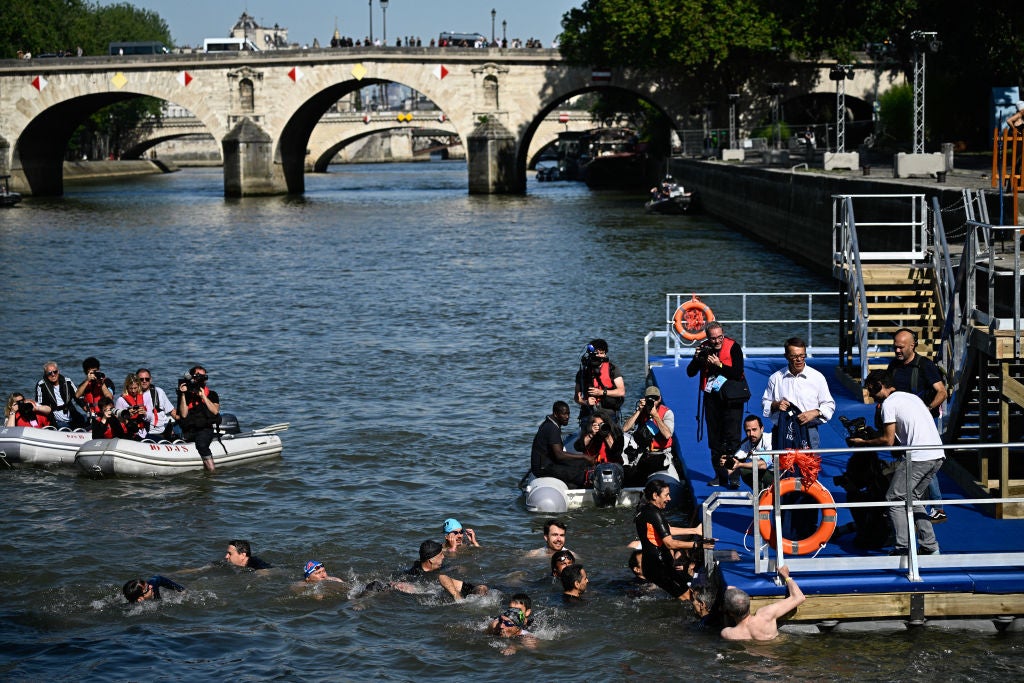Olympic triathlon practice cancelled due to pollution in River Seine, less than 24 hours before first race
A training session for the swimming section, due to held in the Paris river, has been cancelled just 24 hours before the main event

Your support helps us to tell the story
From reproductive rights to climate change to Big Tech, The Independent is on the ground when the story is developing. Whether it's investigating the financials of Elon Musk's pro-Trump PAC or producing our latest documentary, 'The A Word', which shines a light on the American women fighting for reproductive rights, we know how important it is to parse out the facts from the messaging.
At such a critical moment in US history, we need reporters on the ground. Your donation allows us to keep sending journalists to speak to both sides of the story.
The Independent is trusted by Americans across the entire political spectrum. And unlike many other quality news outlets, we choose not to lock Americans out of our reporting and analysis with paywalls. We believe quality journalism should be available to everyone, paid for by those who can afford it.
Your support makes all the difference.A second training session for an open-water swimming event at the Olympics has been cancelled due to pollution in the River Seine, with the familiarisation swim for the triathlon scrapped for the second day in a row.
Athletes were scheduled to take the Seine at 8am on Monday morning, but a joint decision from representatives of World Triathlon and the organisation responsible for carrying out water quality tests was made to cancel the swim for health reasons.
The same decision was reached yesterday, and it comes less than 24 hours before the men’s triathlon race in the first competitive open-water swimming event to be held at Paris 2024.
Water quality is linked to the weather and levels of fecal bacteria known as E. coli are measured daily. The latest test, which was taken on Sunday, followed two days of heavy rain in Paris.
Around €1.5bn has been spent since 2015 in a bid to clean up the River Seine, where swimming has been banned to the public for over a century but will be used to host marathon swimming and triathlon events at the Paris Olympics.
The men’s triathlon is scheduled to take place on Tuesday morning, following a period of brighter weather and organisers remain confident that the swimming section of the event will still be able to go ahead.
The tests carried out in the Seine yesterday revealed water quality levels that in the view of the international federation, World Triathlon, did not provide sufficient guarantees to allow the event to be held,” a statement said.
“This is due to rain that has fallen on Paris on 26 and 27 July and the impact it had on the Seine river.
“Given the weather forecast for the next 36 hours, Paris 2024 and World Triathlon are confident that water quality will return to below limits before the start of the triathlon competitions on July 30.
“As observed in July, with summer conditions (more sunshine, higher temperatures, prolonged absence of rain) water quality in the Seine has improved significantly”.
Heavy rain during the Olympics opening ceremony raised concerns over whether the river would be clean enough to host swimming competitions, with test results released on Friday showing the water quality was slightly above the required level before Paris 2024 started.

Paris Mayor Anne Hidalgo took a dip last week in a bid to ease fears amid worries over pollution levels, in a long-standing vow before the Games, but tests by monitoring group Eau de Paris later found that E. coli levels were above the safe limit on the day she swam.
The Olympics were prepared for the first practice session in the Seine being cancelled, due to the heavy rain that fell in Paris on Friday and Saturday, but the weather is expected to improve ahead of the men’s triathlon race on Tuesday. The women’s event is scheduled for Wednesday and the mixed relay event the following week.
Paris City Hall noted that water quality last week was in line with European rules in six days out of seven.
In explaining the results, it said that “the flow of the Seine is highly unstable due to regular rainfall episodes and remains more than twice the usual flow in summer.”
Join our commenting forum
Join thought-provoking conversations, follow other Independent readers and see their replies
Comments